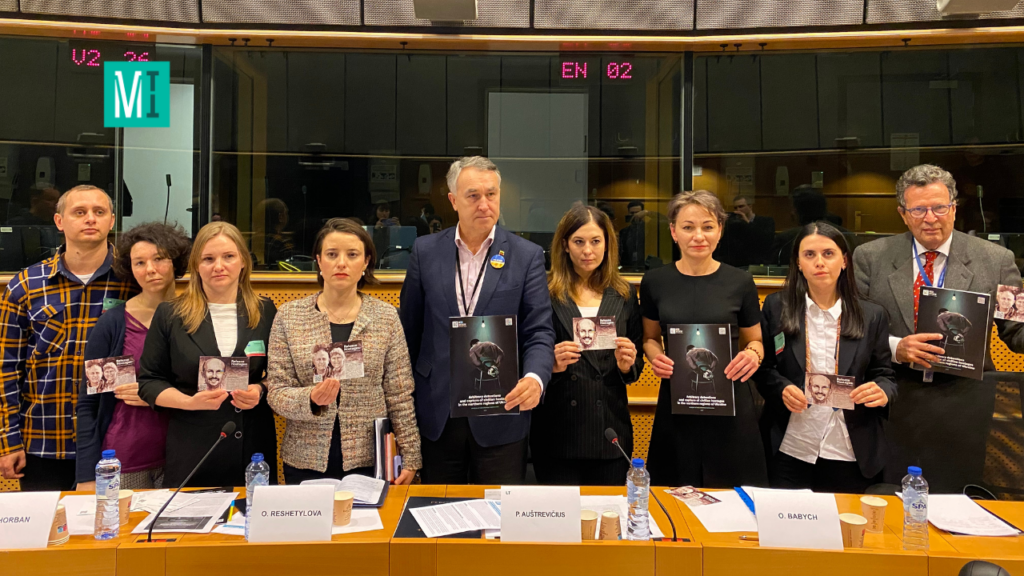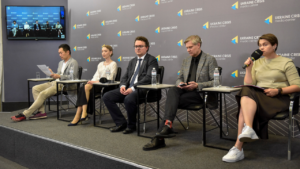“When talking about what the Russians have done in Ukraine, we must call a spade a spade” — MEP Petras Auštrevičius at the MIHR`s event in Brussels

On the eve of the anniversary of Russia’s full-scale invasion of Ukraine, the Media Initiative for Human Rights held its second special event in the European Parliament dedicated to the issue of releasing civilian hostages. The event was initiated and moderated by Petras Auštrevičius, MEP of the Renew Europe group, a Lithuanian politician working hard to support Ukraine.
The event was held to remind European politicians and officials that the terror of civilians in the Russian-occupied territories continues. Thousands of hostage families are still waiting for their loved ones, knowing that they are being held in inhumane conditions and subjected to torture and humiliation in Russian prisons and detention centers almost every day.
“Last year, I visited one of the places used to hold civilians,” said MEP Petras Auštrevičius at the event’s opening. “This place, where terrible things happened, evokes special feelings. We must call a spade a spade and tell the world about these war crimes.”
Mr. Auštrevičius emphasized that the international community must bring to justice those who commit these iniquities.

As of February 2024, the MIHR has identified 1505 civilian detainees held in places of detention both in the occupied territories of Ukraine and throughout Russia. In total, there are more than 100 such places, and the number of detainees may be much higher — there is currently no accurate information about them, as the Russians do not confirm their detention.
Mykyta Horban, a young man from the Kyiv region who was detained by the Russian military along with his father, lost all of his toes as a result of Russian abuse, as they were frostbitten when he and other civilians were forced to lie in the open air in the cold for four days without shoes. After his amputation, the Russian authorities decided to return Mykyta and some other seriously wounded civilians to Ukraine, according to the head of a military hospital in Kursk: “Russia does not want to spend money on your recovery.” However, Mykyta’s father has remained in Russian captivity for almost two years, and the family has no information about his fate.
“When we last saw him in his cell in Kursk, he was in a terrible condition, his finger was almost torn off as a result of torture. My father was very depressed and held on only because I was there. But I was released back in 2022, and I have no idea what is happening to him now,” Mykyta shared about his experiences.

Since 2022, Olha Babych has not heard from her husband Oleksandr, the mayor of Hola Prystan in Kherson Oblast, either. She told the MEPs that Oleksandr stayed in the occupation with his community until the last moment, trying to help people. Like many other mayors, he refused to cooperate with the occupiers, so on March 28, 2022, he was captured by armed Russians and taken to an unknown destination. Only six months after the abduction, Olha learned from witnesses that her husband was in Simferopol’s SIZO-1, and before that, he had been abused for a long time in Kherson’s torture chambers.
“The practice of persecution and detention of Ukrainian civilians by the Russians began in 2014. Therefore, what they are doing in the so-called newly occupied territories was unsurprising. Still, even we were shocked by the scale,” admitted Olha Reshetylova, Head of the MIHR.
“When analyzing the testimonies, we often see the same behavior of Russians in all the territories they visit. For them, terrorizing civilians is a method of warfare. And since the war is closer to every European country today than many people think, it is essential to study the actions of the Russian army and special services and to punish these crimes. This can not only help to free the hostages but also serve as a prevention in the future. Although the only way to stop this terror completely is to de-occupy all Ukrainian territories.”
Analyst Lyubov Smachylo reminded that the MIHR and other Ukraine 5AM Coalition organizations use a shared database of documented violations, IDOC. This allows synchronization of all collected testimonies and evidence to build a case. “The analysis of the documented information shows that the Russians use arbitrary detentions, enforced disappearances, attacks and killings, imprisonment and hostage-taking, inhuman treatment and torture, failure to ensure the right to a fair trial, and extrajudicial executions against the civilian population in Ukraine. In general, people are being persecuted based on their self-identification as Ukrainians. All these acts of the Russians can be qualified as crimes against humanity. This is what we are trying to prove with the I-DOC.”

Commenting on what she heard, MEP Karen Melchior said she was impressed by the scale of work in the IDOC database and believes that this data should be used internationally to bring Russia to justice.
Giorgos Kyrtsos, MEP from Greece, thanked the victims for their speeches and summarized the event with his words: “Your sacrifice is not only for Ukraine. It is a sacrifice for the whole of Europe. And we understand that”.






